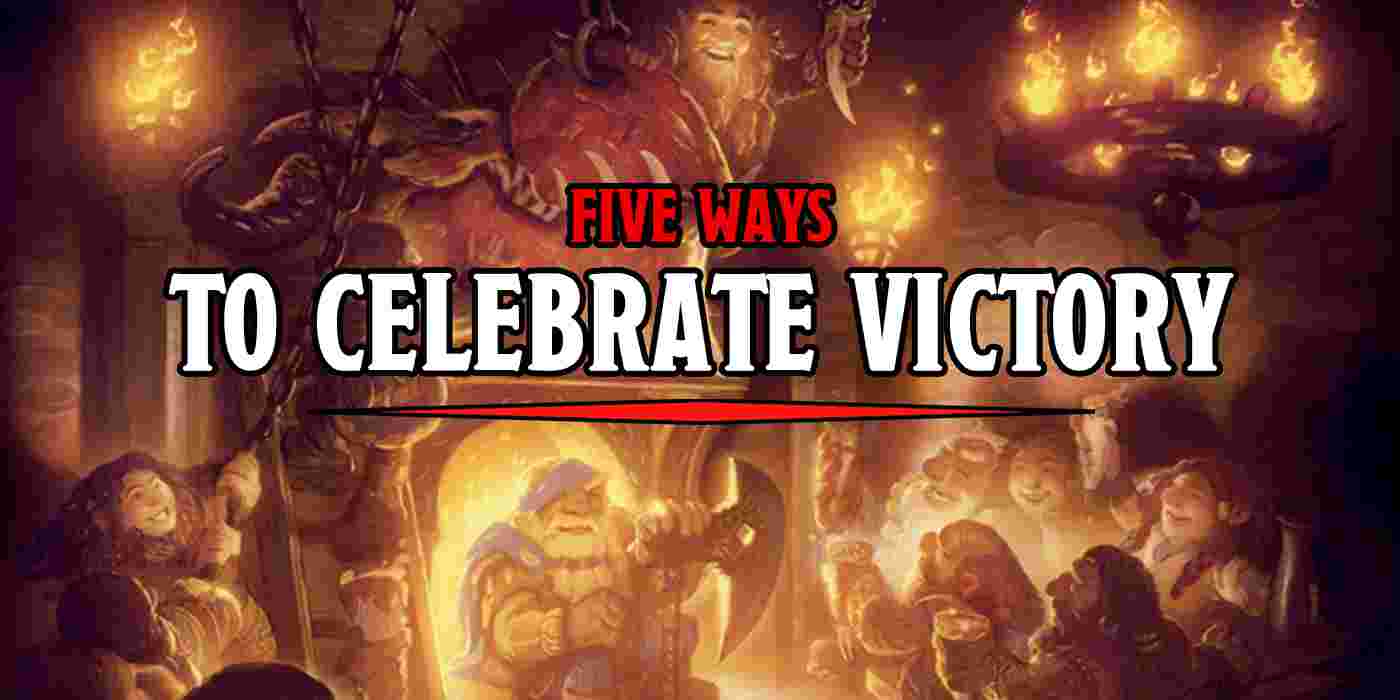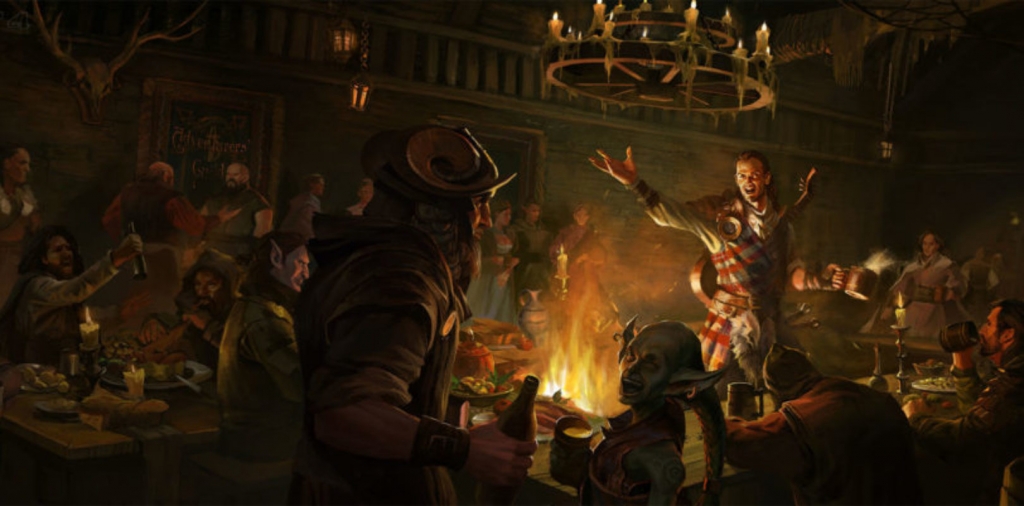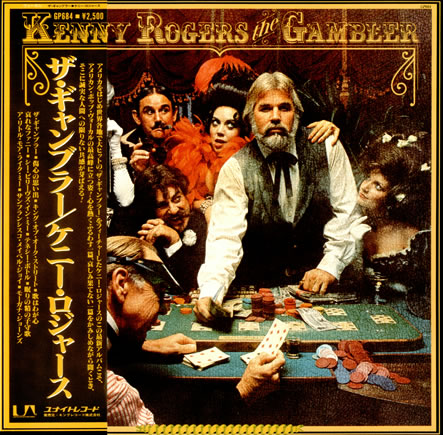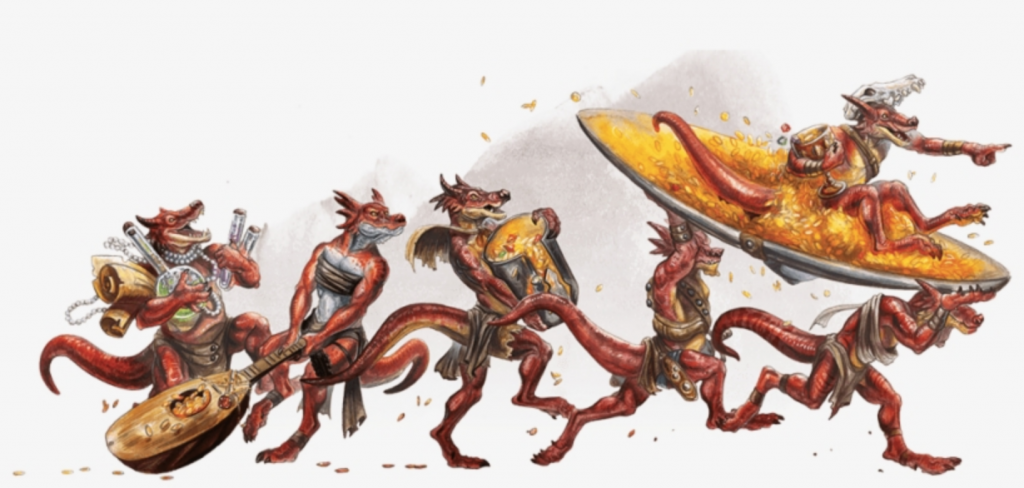D&D: Five Ways To Celebrate Your Victory

Once you’ve finished the adventure and looted the hoard, it’s time to celebrate your victory! But how? Try these celebratory activities in D&D.
There comes a point where even the most hardy of adventuring parties finds themselves with time off. They’ve defeated the evil wizard or slain the dragon or convinced the ogres to relinquish their hold on the deed to the old mill or built a kobold democractic republic and established themselves as newly elected god-kings-and-queens, but eventually you need to sit back and celebrate your victory.
But how? The downtime activities in Xanathar’s Guide to Everything can be a lot of fun. So let’s take a look at five ways your characters can celebrate their accomplishments!
Carousing
Perhaps the most iconic way for your adventurers to celebrate! With options for adventurers with money to burn or on a budget, carousing has it all. Your characters will spend their time and money on fine food, strong drink, and good friends. Carousing is all about socializing and celebrating. If you do it well, you might make friends.
As a result of your celebration, you make a Charisma check and might have some new friends. Of course, you might end up with a rival NPC, just like in real life. You could end up with more responsibilities. Who hasn’t woken up from a party night and found themselves in charge of running a local festival, play, or similar event?
When playing out these scenarios, consider who the characters like. This is a perfect chance to catch up with a favorite NPC and attend a feast, and participate in skill challenges as contests. Get those fun good-time vibes in.
Religious Service
For those of you who are concerned about getting too swept up in victory or if you’re the lawful good paladin everyone always talks about and there’s no way to get that stick out from where it’s been lodged since level 1, there’s the religious service option. And while this is mostly aimed at characters who are clerics or paladins or the like, consider that some religions are stoic affairs of fasting and prayer – but others, well, the term bacchanal springs to mind from, oh right, Bacchus. So.
Complications can include being sent on a holy quest or accidental blasphemy. If you’re playing these out, consider what the characters are doing, and look for skill checks like Performance, Persuasion, Knowledge (Religion), and possibly Intimidate.
Gambling
The option of real heroes. Gambling can be a ton of fun if played traditionally–the characters can see if they can double their hard-earned treasure by engaging in some illicit gambling. The suggested method is Wisdom (Insight), Charisma (Deception), and Charisma (Intimidation) to see how well you do when gambling.
But you could also play the whole thing out like a tournament. Have the characters make checks each round, as they try and win a spot at the top. You could even seed some villains in there, or introduce a rival or NPC the players need to impress/talk to.
Crime
Look at how much fun those kobolds are having. While you might be thinking, wait, aren’t we flush with treasure? Why do we need to commit crimes? You’re missing out on the best part about having treasure.
Money means you don’t have to suffer any consequences. Real life teaches us this every day, just turn on the news and you’ll find no end of examples of poorer folk suffering so that rich people can get away with the most heinous crimes, like wage theft, carried out in broad daylight.
D&D is a power fantasy, why not be on the other end of the ‘getting screwed by rich people’s brazenly illegal activities’ and pretend to be a Batman villain for a little while for once.
Research
Or, if you’re anything like me, the best way to celebrate being done with an adventure is to catch up on that reading you definitely meant to do. And that’s where the Research tables come in. Ordinarily, the table is meant to reflect a workweek each time you roll – but consider giving characters the opportunity to make a Constitution check to take on an extra workweek in the same allotted time, representing all-nighters and cram sessions as the character works furiously to try and accomplish something.
Of course, you can stack on levels of exhaustion. Or add an increased risk of a complication like: “a sage becomes obsessed with convincing you of a number of strange theories about reality.” You might end up with my favorite: “if you had known that book was cursed, you never would have opened it.” All in all, pretty typical results of trying to get your end-of-semester assignments done in two days.
Next time you need to celebrate, break out one of these downtime activities and go to town!
Happy Adventuring!










